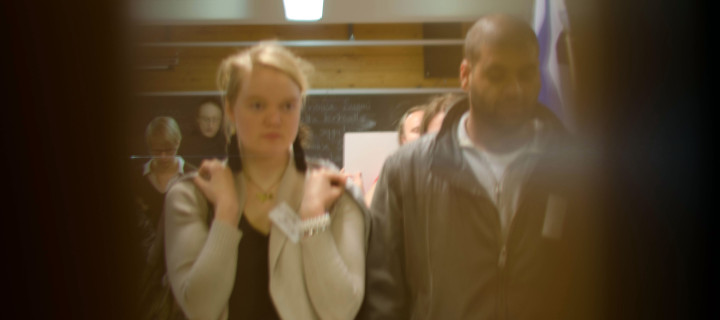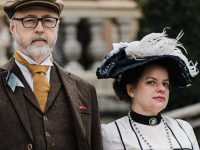Thanks to it I turned my communist friend into a patriot. And I realized who I really am.
This is how a respondent, according to Mochocki (2012), described the Polish tabletop role-playing game Dzikie Pola (“Wild Planes”) in an online survey. The game was set in a period of Polish history dating to 1569 – 1795, and it apparently spawned a vibrant larp scene dedicated to re-enactment.
The era is referred to as the Sarmatian period, and Mochocki appears to see it as a golden past central to all Polish culture. He gives the quote in a positive tone, to portray the “liminal quality” of the experience of “sarmatization” that the players had when living a nationalist construction in the games and related activities.
In larp, the asymmetric power relation between the “authors” and the “audience” seems to manifest more concretely than, say, in cinema. One (but by no means the only) difference is that film spectators rarely discuss their experience with the directors.
However, the contact between organizers and players does not usually end when a larp does. Much of the “sarmatization” described by Mochocki happened outside the actual game events. Often larp organizers have an active role in post-game discussions, which can change the player experience after the game.
In System Danmarc (2005), a game set in a cyberpunk future, the players experienced living in a slum. At the end of the game, they were shown a documentary where real-life Danish prostitutes, drug addicts, homeless people, researchers and social workers talked about social exclusion and inequality. It turned out that there were people in Copenhagen already living the future dystopia.
According to Munthe-Kaas (2010), one player described the film as follows:
I was ready to cry watching it. I wanted to help all those people. Because my character was that way, only now the filter was gone, and it was me wanting to help.
Munthe-Kaas writes:
Generally the ending was received very well and many participants afterwards mentioned the film as a central part of their experience. On the other hand, some participants found the ending to be manipulative and politically colored.
A different example is provided by De tusen rosornas väg (2000) (“Road of the Thousand Roses”). It was a medieval fantasy larp about a war between two nations. On one side, the players sang battle songs provided by the organizers, which created a strong patriotic feeling. At the end of the game, the organizers revealed that the songs were in fact translated from the Hitler Jugend songbook and that many other aspects of the game fiction were also adopted from Nazi Germany.
Apparently, some of the participants were quite upset by the announcement. But many also said they had come to a whole new understanding of Nazi Germany. (Englund, 2013, p. 44; see also Fatland, 2011)
In both cases, revealing the connection to reality reframed the larp experience. Perhaps the players felt that the fiction they had collectively created was taken away from them. We met a similar phenomenon with our game Halat hisar (2013). It was set in a fictional occupied Finland that mirrored real-world Palestine. The players knew this beforehand, but some of them were troubled by the way the correspondence to reality was treated in post-game discussions.
One player brought up the feeling of not being in control of her/his experience anymore.
One aspect that made the game feel real and intense was that we had Palestinian players. Their presence served as a reminder that the occupation really existed. After the game, many players wanted to know which parts of the fiction were based on reality and which were made up. Upon their request, I wrote a text that clarified the connections and provided references. We put it up on the website. According to some players, this greatly helped the processing.
Games Without Agenda?
It is sometimes argued that larps should not have a political agenda or that political topics should be treated in a “neutral” manner. However, every text is written and every larp is designed from some kind of a political perspective. Selecting a topic is already a political choice. When something is referred to as “neutral”, it is usually because it reflects the default assumptions in the society.
There have been some larps about the Finnish civil war of 1918. To my knowledge, the most recent one was Viena 1918 (2014) (“Viena Karelia 1918”). The head organizer, Mikko Heimola (2014) wrote that he wanted to equally portray both parties of the conflict as farcical, oppressive, and stupid. However, this is a political choice as much as presenting one side as better than the other would have been.
Games can be political even when they don’t seem to be. What if the organizers of De tusen rosornas väg had never told the players that the songs came from Hitler Jugend, so that they would have been left to believe the game was a harmless fantasy adventure?
The game would still have been political, just in a different, rather frightening way. Now imagine that the songs were not direct translations from the Hitler Jugend songbook, but had similar themes. Imagine they were really written by the organizers. Imagine that the organizers had never read the Hitler Jugend songbook and were unaware of any connections.
Doesn’t the case of De tusen rosornas väg demonstrate that the Hitler Jugend songs embodied something that is rather commonplace in “harmless” fantasy? If there had been elements that felt out of place or disturbing, would the players have been so surprised after the game?
Thinking through the post-game discussion When designing games, the organizers should take into account that they can affect player experience even after the game, in particular if there is a strong connection to reality. Debrief is often viewed as part of the design. Maybe post-game discussions should be seen in similar light, especially as online groups provide a means to continue collective processing for an extended period of time.
Organizing larps is stressful. When making Halat hisar we did not give much thought to what would happen beyond the after-party. The game turned out more intense than we had dared to hope, so we created a Facebook group for the players to process their experience. The game was an emotional experience for us organizers as well, and in the beginning, I thought I could freely express myself in the group the same way the players did.
I quickly realized this was a mistake. As an organizer, I was in a position of power and I could not discuss with the players on an equal footing. My posts were interpreted differently, and things I said could be seen as attempts to reframe player experiences.
Some players felt that participating in the game had forced a political agenda on them in the eyes of the organizers and other players. They felt that everyone in the group was assumed to be, in the words of one player, a pro-Palestinian activist
.
Now that I read the posts again after a year of distance, I am almost surprised at how little controversy there was. Nevertheless, the discussions made me emotional at the time. To correct my mistake, I decided to refrain from commenting as best as I could. Sometimes I did not even dare to “like” comments of others because I didn’t want to steer the discussion.
However, trying to stay away from all political discussion was a mistake, too. It’s a good idea to give the players space to think for themselves and not to flood them with explanations and information. But nothing happens in a void. There is a political context outside the online group, and it, too, affects the discussion.
Sometimes it is the organizers’ responsibility to take a stand. For instance, some players criticized Halat hisar for being “one-sided”.
We made the choice to take the viewpoint of the occupied because the oppressors and the oppressed are not two equal sides. To present them so is to take the side of the stronger party, the oppressors. Some of the members of the processing group were Palestinians who live their daily lives under occupation. Taking this into consideration, I feel that it would have been my responsibility to point out the real-world power imbalance that we wished to tackle by concentrating on the experience of the oppressed.
In summary, as a part of the design process, larp organizers should think about how they will take part in post-game discussions. A player debrief group is not a debrief group for the organizers, who should be conscious about their positions of power.
It is important to leave the players the freedom to discuss the game content. However, real-world political context and the diversity of players should also be taken into account, and the organizers have the responsibility to moderate when needed.
Bibliography
Tindra Englund (2013): Lajv, ett möjligt verktyg för konflikttransformation? Malmö University. http://muep.mau.se/bitstream/handle/2043/15868/lajv, ett m jligt verktyg f r konflikttransformation.pdf?sequence=2 (accessed Jan 10, 2015)
Mikko Heimola (2014): Viena 1918: Punaisia, valkoisia ja purkmanneja Karjalan laulumailla, Loki. http://loki.pelilauta.fi/?p=2139 (accessed Jan 10, 2015)
Michal Mochocki (2012): Reliving Sarmatia: National Heritage Relived in the Polish Larp Scene, in States of Play: Nordic Larp Around the World, Helsinki: Pohjoismaisen roolipelaamisen seura.
Peter Munthe-Kaas (2010): System Danmarc: Political Action Larp, in Nordic Larp. Stockholm: Fëa Livia
Juhana Pettersson (editor), (2012): States of Play: Nordic Larp Around the World. Helsinki: Pohjoismaisen roolipelaamisen seura.
Jaakko Stenros and Markus Montola (editors) (2010): Nordic Larp. Stockholm: Fëa Livia.
Ludography
De tusen rosornas väg, 2000, Boss, E., Hjorter, J., & Jonsson, S. Sweden. Performance: Larp.
Halat hisar, 2013, AbdulKarim, F., Kangas, K., Mustafa, R., Pettersson, J., Pettersson, M. & Rabah, M., Parkano: Pohjoismaisen roolipelaamisen seura. Performance: Larp. http://nordicrpg.fi/piiritystila/ (accessed: Jan 10, 2015)
System Danmarc, 2005, Copenhagen: Opus. Performance: Larp.
Viena 1918, 2014, Heimola, M. & al. Sipoo: Harmaasudet. Performance: Larp. http://www.helsinki.fi/~mheimola/ viena1918/index.shtml (accessed: Jan 10, 2015)
Video Sources
Eirik Fatland (2011): Can Playing Games Teach Us About War, Nordic Larp Talks. (accessed Jan 10, 2015)
This article was initially published in The Knudepunkt 2015 Companion Book which was edited by Charles Bo Nielsen & Claus Raasted, published by Rollespilsakademiet and released as part of documentation for the Knudepunkt 2015 conference.
Cover photo: Students and foreign visitors demonstrate against a visiting dignitary from the occupying government. (Halat hisar, play, Johannes Axner) is licensed under CC BY-NC-SA 4.0.






